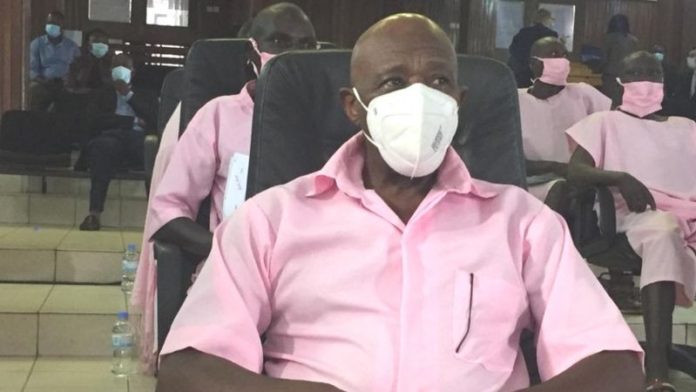INTRODUCTION
On 12 March 2021, RUSESABAGINA Paul declared to the court that he will no longer attend the trial involving him especially the case RP 00031/2019/HCCIC. In this regard, a letter from Nyarugenge Prison where RUSESABAGINA is being held was read out, saying that he would no longer attend the trial. He told Nyarugenge jail that he will never again appear before this court, not just today but even for future hearings. He said that he does not expect any justice from this court,” according to the letter, written by prison director Michel Kamugisha.
Presiding judge Antoine Muhima ruled the trial would continue.
Rusesabagina chose not to attend this hearing and he has a right to do so but choosing not to appear does not stop the trial from proceeding, dixit Muhima.
Meanwhile, the Belgian advocates of the accused seized the Belgian court of instance against NIYOMWUNGERE Constant who also is Belgian resident and citizen; the air company whose plane brought RUSESABAGINA and others for the abduction of their client.
The effect of such a decision from the accused is that the court will try the case in default and will consider the party as supposed having appeared if he is regularly summoned and consequently if he fails the trial, he will lose the chance to introduce the remedy of opposition. He will just keep the right to appeal against the expected sentencing judgment. The issues susceptible to raised hereby is whether he was right to give up the sessions on one side and on the other side the legal implications of the complaint submitted to the Belgian court against people who played a role in the hostage taking and abduction of RUSESABAGINA on the fate of the latter.
1)Defence position during the trial .
As the trial opened, Rusesabagina told the court that he is a Belgian citizen being held “hostage”, and questioned its competence to try him.
“It is our considered view that this court doesn’t have the jurisdiction to try my client as a Belgian citizen. He must be tried by Belgian courts,” Gatera Gashabana, his defense lawyer, said.
“Even prosecution acknowledged that Rwandan courts didn’t have competence to try him when it had asked Belgium to take over the case years back.”
It is, therefore, our prayer for the court to consider that Rusesabagina can stand trial in Belgium, the defense counsel added, a request objected to by prosecution.
While the defense acknowledged that a Belgian citizen can be tried under the Rwandan laws, it maintained that the arrest last year of Rusesabagina was not through proper legal channels.
The court adjourned the hearing to Feb. 26, when it will pronounce its ruling on the jurisdiction of the court.
Rusesabagina, 66, had reportedly been in Dubai last year, where he departed legally on a private jet. The United Arab Emirates denied any involvement in the arrest.
Rwandan President Paul Kagame last year refuted claims that Rusesabagina was kidnapped to be brought to Rwanda, saying the Hotel Rwanda star was responsible for his own arrest.
2)Withdrawal Reasons
Rusesabagina was last year charged with multiple counts, including terrorism, forming and recruiting people into an armed organization, issuing instructions for terrorism acts, and complicity to murder and arson. During the trial, he raised a series of objections which were quite all rejected, probably reason pushing him to not expect fairness from this Rwandan court, overtly having already convicted him.
1°As the trial opened, Rusesabagina told the court that he is a Belgian citizen being held “hostage”, and questioned its competence to try him;the court put aside the issue of abduction and confirmed its competence ratione materiae and ratione loci.
2°Mr. Rusesabagina asked the court to release him on bail, citing poor health, but his request was rejected. The prosecution described him as a flight risk.
Shortly after the ruling, Mr Rusesabagina’s family in Belgium released a statement noting that the court’s refusal to talk about circumstances surrounding his arrest amounted to an unfair trial. Flight logs have identified a private jet that took off from Dubai and landed at Kigali at 6am on 28 August, which is believed to have been carrying Rusesabagina. During pre-trial hearings Rusesabagina told judges he had been kidnapped after being duped. Kagame denied the allegation but has suggested Rusesabagina had been the victim of some kind of trick.
Because of his Belgian citizenship and the circumstances of his arrest, she said, Rwanda “does not have jurisdiction to adjudicate this case, and should dismiss the charges and permanently stay the proceedings,” she said in an email.
3°Mr. Rusesabagina’s lead counsel, Kate Gibson, said the proceeding should not even start given the many “fair trial violations.” Ms. Gibson is one of three of Mr. Rusesabagina’s international lawyers who have not been allowed into Kigali to represent him.
4°The trial has attracted significant international attention. In December more than 30 members of the US Congress asked Kagame to release Rusesabagina on humanitarian grounds and allow him to return safely to the US.
5°The European parliament last week called on Rwanda to give Rusesabagina a fair trial and condemned what it called his enforced disappearance, illegal rendition to Rwanda and incommunicado detention. Rwanda’s parliament rejected the “baseless assertion”.
6°Rusesabagina’s daughter said the charges against her father were fabricated and that he was denied his choice of defence lawyers. The judiciary spokesperson, Harrison Mutabazi, said Rusesabagina was being tried like any other citizen.
7°During his last appearance on March 12, when the court ruled against Rusesabagina’s request to have six months to prepare his defense, he said he was quitting the trial as “my basic rights to defend myself and to have a fair trial were not respected.”
His family insists that he has not been given access to over 5,000 pages of documents in his case file.
3)Effects of the objection
As stated by the judge MUHIMA Antoine presiding the sessions, the case will continue its course and predictably the concerned will be convicted and sentenced to penalties provided for by the law. The accused will have the opportunity of appealing before the court of appeal within 30 days after notification of his judgment. Predictably even The Court of Appeal will confirm the same decision and fro the accused will then remain the application for review or recourse to the ombudsman for injustice or corruption which would have marked his trial. In any case, RUSESABAGINA has no chance in Rwanda if he stays in that country unless the international community and foreign superpowers exercise their pressure and threat of sanctions to push this reluctant state to free him and allow him to rejoin his family. Which requires the weight of diplomatic pressure beyond the bench of Rwandan courts.
4)Effects of the Belgian court decision
The Belgian court will surely condemn the authors of the abduction of Paul RUSESABAGINA especially as NYOMWUNGERE Constant confessed his role in the operation whereby he was collaborating with RIB; statement corroborated by the Rwandan minister of justice. If that bishop NYOMWUNGERE Constant is convicted and sentenced, it easily shows that he will not return in Belgium and he is there he will tempt to flee from there fearing to face penalties.
in addition, the Belgian decision may be submitted to the court of Kigali judging the case as evidentiary element of the forced disappearance of which the accused has been victim but this will not change anything given that the court has already ignored this objection which in fact incriminate the Rwandan state. In this regard, there should be also discussed about the effect of a foreign criminal decision on national proceedings. What we generally know civil judgments can be enforced in Rwanda in what is called exequatur but in our opinion criminal judgments may serve as a mere evidence or not depending upon the sovereign appreciation of the judge.
5)Issue of fair trial before Rwandan courts
An apparent mistake has confirmed what most of the world already knew: government critic Paul Rusesabagina is unlikely to receive a fair trial in Rwanda . In a recorded video call, Rwanda’s justice minister, Johnston Busingye,admitted the government role in the August 2020 enforced disappearance, illegal transfer, and fair trial rights violations of Rusesabagina, whose trial on terrorism charges began on February 17.
Al Jazeera broadcast excerpts from a call between Busingye and two consultants from the British PR firm Chelgate, which Al Jazeera said was “inadvertently” shared with them. In the clips, Busingye admits that Rwandan prison authorities intercepted privileged communications between Rusesabagina and his lawyers, in violation of his due process rights.
Busingye also admitted the Rwandan government paid for the flight that brought Paul Rusesabagina, a Belgian citizen and US green card holder, from Dubai to Kigali on August 27, 2020, claiming it was legal. At the time, Human Rights Watch found that Rusesabagina was the victim of an enforced disappearance for three days while in the custody of Rwandan officials or their proxies. Rusesabagina has said that he was not aware of where he was and was kept blindfolded with his hands and feet bound.
When authorities deprive someone of their liberty and refuse to acknowledge the detention, or conceal the person’s whereabouts, they are committing an enforced disappearance, a crime under international law. Enforced disappearances, often leading to torture and unfair trials, have become a regular practice in Rwanda under Busingye’s watch.
Extradition proceedings overseen by an independent tribunal are required to assess whether a suspect’s rights will be guaranteed. The Rwandan government continues to change its tune on how Rusesabagina was taken into custody and transferred to Rwanda. Despite this, on February 26, Rwanda’s High Court Chamber for International and Cross-border Crimes ruled that it has jurisdiction to try him.
Busingye’s admission that the Rwanda Correctional Service (RCS) has been reading correspondence between Rusesabagina and his lawyers violates Rwandan and international legal standards, which protect all communications and consultations between lawyers and their clients within their professional relationship as confidential. The government’s subsequent claim that the RCS had mistaken privileged for non-privileged communications rings hollow.
Busingye’s revelations only undermine further the idea that Rusesabagina could ever get a fair, credible trial in Rwanda and that victims of the attacks he is accused of supporting will see justice delivered.
CONCLUSION
Rwanda minister of foreign affairs recently met the Belgium ambassador and during their talks he disproved the interference of Belgium in the case of RUSESABAGINA. This is an indicator among many others that possibilities of the Belgian citizen to quit Rwanda to Belgium or US where lives his family are far from being decided. Meanwhile, it is noteworthy to approve the initiative of the Belgian advocates of the concerned to seize the Belgian court with his forced disappearance. Even if it will not tangibly impact on the trial held in Rwanda, the verdict may serve in the diplomatic way as international community and foreign superpowers have not yet got a document supporting their wishes to release their citizen and resident basing then on the offending role of Rwandan authorities in the abduction skillfully carried out.
By The Rwandan Lawyer





























































